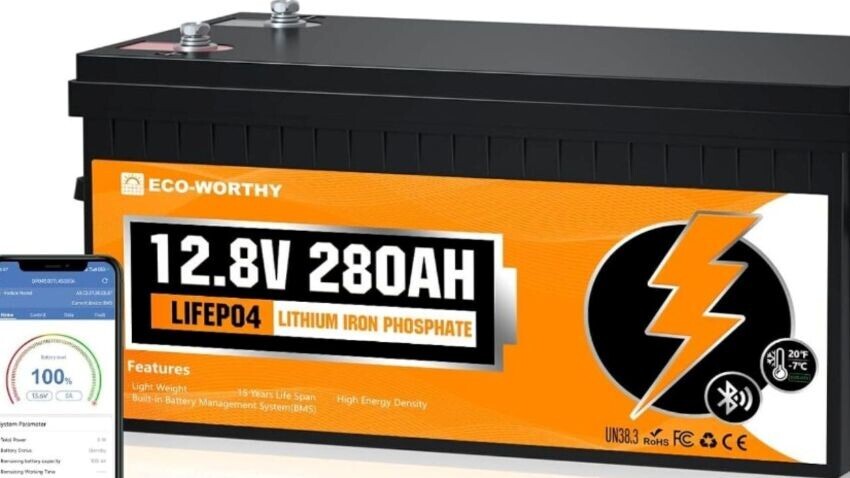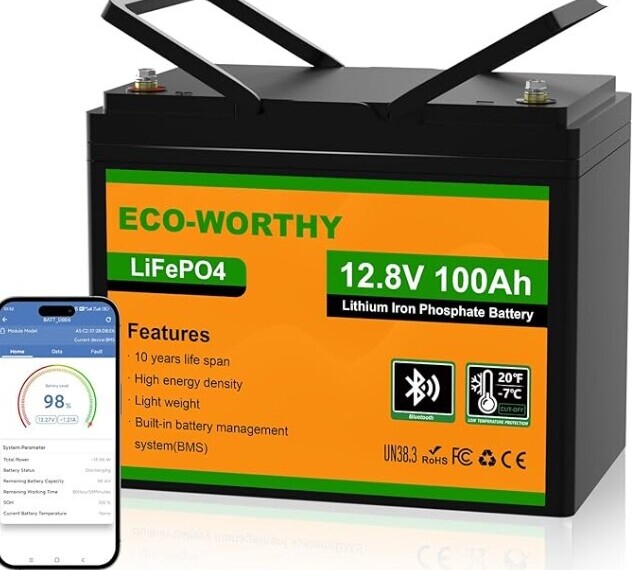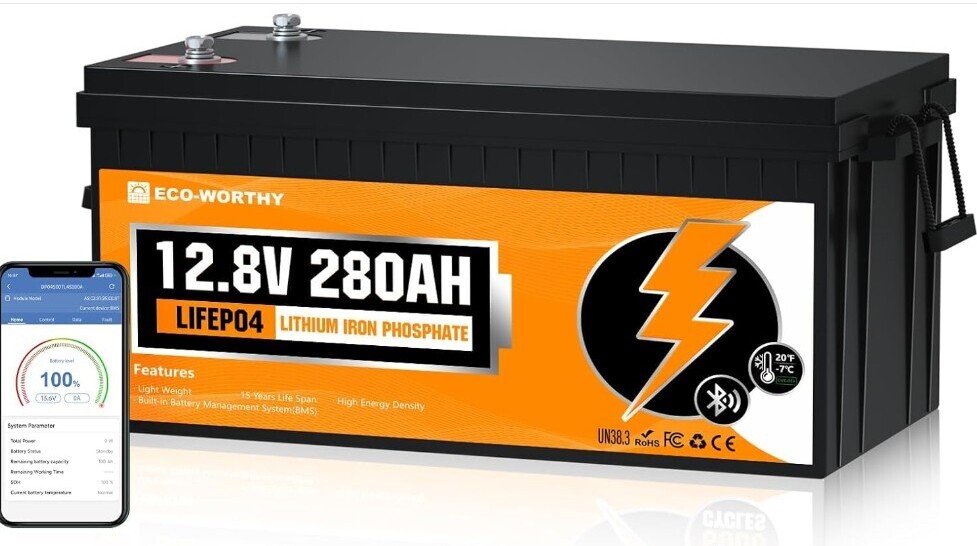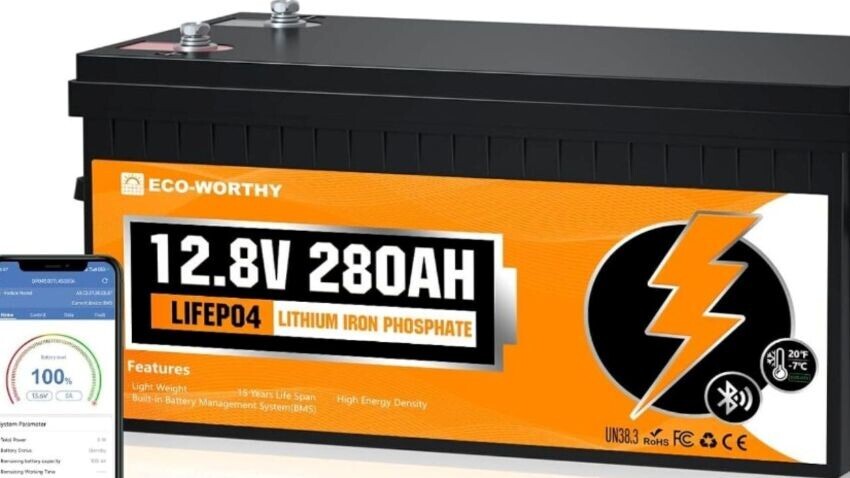
Many homeowners and RV travelers need dependable backup power, whether preparing for outages, living off-grid, or traveling. That’s why we review ECO-WORTHY’s affordable solar and energy storage solutions to help you determine if they meet your needs.
This content will review two of the brand’s most popular LiFePO4 batteries:
- ECO-WORTHY 12V 100Ah LiFePO4 Lithium Battery.
- ECO-WORTHY 3584Wh 12V 280Ah LiFePO4 RV Battery.
We will detail these products’ key features, performance, ideal use cases, and comparisons to help you determine which model best meets your power needs.
The ECO-WORTHY Brand Overview.
The ECO-WORTHY company was founded in 2007 to manufacture off-grid energy accessible to homeowners, RV owners, and DIY solar enthusiasts.
The brand’s product lineup features solar panels, inverters, and a wide range of LiFePO4 batteries providing long cycle life, reliable performance, and safer operation than many traditional options.
People looking to lower energy bills or gain more independence from the grid widely use ECO-WORTHY batteries in U.S. homes, cabins, and recreational vehicles.
Most praise ECO-WORTHY for providing good value at a competitive price, making the brand a popular choice among budget-conscious consumers.
ECO-WORTHY 12V 100Ah LiFePO4 Lithium Battery.
This convenient and flexible 12V 100Ah LiFePO4 battery provides more than just reliable power, making it ideal for RVs, boats, cabins, and small off-grid systems compared to traditional lead-acid or AGM batteries.
Key Features.
- Bluetooth 5.0 tracks voltage, current, and capacity in real time directly from your smartphone, giving you confidence during trips or power outages without guessing your battery status.
- BCI Group 24 size (10.23 × 6.6 × 8.43 in, 23.15 lbs universal fit makes replacing older Group 24 batteries easy, without wiring modifications.
- A 100A BMS and Grade-A cells built-in battery management system protects against overcharge, low temperature, short circuits, and more.
- Low-temperature cut-off automatically stops charging below -7 °C (19.4 °F) to protect the cells in winter.
- An expandable 2S4P configuration allows you to build the system up to 10.24 kWh by connecting multiple units for growing energy needs.
- 30 days to return the battery or ask for a replacement.
- 3-year warranty and fast support to resolve possible issues.
Pros and Cons.
Pros.
- Smart Bluetooth monitoring is rare in this price range.
- Lightweight and easy to install.
- Excellent safety protections for year-round use.
- An expandable design gives flexibility for future system upgrades.
Cons.
- A basic app compared to some premium brands.
- Cold weather protection works for charging but not for discharging.
- A higher-voltage system may still be required for larger power setups.

Ideal Use Cases.
- RV owners who want a simple power upgrade.
- Off-grid cabins or weekend homes.
- Boat owners and trolling motor users.
- DIY solar beginners building a small energy system.
ECO-WORTHY 3584Wh 12V 280Ah LiFePO4 RV Battery.
The 3584Wh 12V 280Ah LiFePO4 RV Battery is suitable for users who need serious power capacity for extended RV trips, cabin living, or larger solar backup systems.
Key Features.
- A built-in Bluetooth module lets you directly track voltage, current, and capacity from the ECO-WORTHY app.
- The battery supports proactive troubleshooting within a 15-meter range.
- A reinforced internal metal frame improves shock resistance and prevents cell expansion over time, a key factor for battery longevity.
- Charging halts below −7 °C (19.4 °F) and resumes at 0 °C (32 °F).
- Discharging cuts off at −20 °C (−4 °F) to protect the battery in harsh climates.
- Flexible expansion supports up to 4 batteries in parallel or series, enabling users to build up to 1120Ah at 12V or move to 48V solar systems to suit mobile and stationary power setups.
- Charging options:
- 14 hours with a 12V 20A charger.
- ~6 hours with a 600W solar panel.
- 14 hours with a 20A DC generator.
- The company offers a 3-year warranty and a 30-day return policy.
Pros and Cons.
Pros.
- High energy capacity for longer power autonomy.
- Rugged internal structure adds extra durability.
- Excellent low-temperature protection.
- Scalable system for both RV and 48V solar use.
Cons.
- Heavier and bulkier than the 100Ah model requires proper mounting and space.
- Beginners can find the installation complex.
- The Bluetooth connection range is limited to short distances.

Ideal Use Cases.
- RVs and motorhomes for extended trips.
- Off-grid cabins and tiny homes.
- Larger home backup or 48V solar systems.
- Users who plan to scale their power setup over time.
100Ah Vs 280Ah LiFePO4 ( Comparison Table).
Choosing between the ECO-WORTHY 12V 100Ah LiFePO4 Lithium Battery and the ECO-WORTHY 3584Wh 12V 280Ah LiFePO4 RV Battery depends on power needs, space, and budget.
| Feature | 100Ah Model | 280Ah Model |
| Capacity (Wh). | 1,280 Wh. | 3,584 Wh. |
| Voltage. | 12 V. | 12 V (Expandable to 48 V). |
| Battery Management System (BMS). | 100A BMS. | 200A BMS. |
| Bluetooth Monitoring. | Yes (Basic App). | Yes (Real-Time Monitoring) |
| Low-Temperature Protection. | Charging cut-off below −7 °C. | Charging cut-off below −7 °C, discharge cut-off −20 °C. |
| Expandability. | 2S4P up to 10.24 kWh. | Up to 4 in series or parallel for 48 V / 1120Ah. |
| Dimensions (L×W×H). | 10.23 × 6.6 × 8.43 in. | Larger and heavier (requires mounting space). |
| Weight. | ~23 lbs. | Heavier (higher capacity and frame). |
| Recommended Use. | RVs, boats, light off-grid setups. | RVs, cabins, and larger solar backup systems. |
| Price. | $189. | $429. |
| Warranty. | 3 years. | 3 years. |
Key takeaway:
- Choose the 100Ah model for smaller setups, light power needs, and quick installation.
- The 280Ah model offers triple the energy, advanced protection, and better scalability, but it’s heavier, more expensive, and requires more planning for correct installation.
Our guide on the best walk-in bathtubs for seniors can also help enhance comfort and independence at home.
Performance and User Feedback.
Both batteries have solid reputations among RV owners, off-grid DIYers, and homeowners looking for reliable backup power.
Many U.S. users praise the 100Ah model for its lightweight design and Bluetooth monitoring, which makes it easy to track charge levels during trips.
It performs well for powering basic appliances, lighting, and small inverters, making it a favorite for weekend RV travel or small solar setups.
The 280Ah model, on the other hand, stands out for its high capacity and ability to run larger loads for more extended periods.
- Reviewers often highlight its durable construction and low-temperature performance, which keeps it stable even during cold nights in northern states.
- Its expandability for 48V systems also makes it popular among more experienced solar users.
Users also note across forums and review platforms that both batteries deliver close to their rated capacity and remain stable over time, especially when paired with proper chargers and solar controllers.
Seniors who need modern power solutions to stay independent and secure can also check out the 5 Top Lightweight Folding Electric Scooters.
Tips for Choosing the Right ECO-WORTHY Battery.
Selecting the correct battery when choosing between the 100Ah and 280Ah models is essential.
- The 100Ah model is perfect for lighting, laptops, small fridges, and basic inverters, while the 280Ah version can handle larger loads such as air conditioners, bigger refrigerators, or extended off-grid power.
- The 280Ah offers more flexibility with series and parallel connections, especially for 48V setups if you plan to expand later.
- Most users can easily install the smaller unit, while the larger battery may require heavier cabling, better ventilation, and secure mounting.
- Low-temperature charging protection is essential for individuals living in colder U.S. states ot countries.
- Both models include a 3-year warranty if you buy from a trusted retailer like Amazon.
Helpful Tip: Calculate your daily power consumption (in Wh) before purchasing, to avoid over- or undersizing your system.
Seniors with hearing issues can also check out a detailed review of the Audien Atom Hearing Aids.
FAQS About ECO-WORTHY Batteries and Solar Products.
How to install ECO-WORTHY solar panels?
ECO-WORTHY products come with DIY-friendly installation, but larger systems may require professional help to ensure safety and compliance with local electrical codes.
What are the benefits of ECO-WORTHY products?
ECO-WORTHY offers affordable prices, modular solar systems, and strong safety features like BMS protection and low-temperature cut-offs. Many of the brand’s products also include Bluetooth monitoring to track real-time performance, providing good value for beginner and intermediate solar users.
Why is ECO-WORTHY a good choice for renewable energy?
The ECO-WORTHY batteries and panels are widely available, easy to scale, and compatible with standard 12V and 48V systems, making going solar more practical and budget-friendly for many homeowners and RV owners.
When should I replace my ECO-WORTHY batteries?
Most ECO-WORTHY LiFePO4 batteries offer 3,000+ charge cycles, translating to several years of regular use. Consider replacement when you notice a significant drop in capacity (e.g., not holding a charge for as long as before) or if the battery fails to maintain voltage under normal load.
You can also check out this step-by-step off-grid installation guide from EnergySage for more practical guidance on planning complete solar setups.
Final Thoughts.
The ECO-WORTHY 12V 100Ah LiFePO4 Lithium Battery and the ECO-WORTHY 3584Wh 12V 280Ah LiFePO4 RV Battery provide reliable performance, making them excellent choices for homeowners, RV travelers, and anyone aiming to cut their reliance on the grid.
The 100Ah model is more budget-friendly for lightweight use, such as RVs, boats, and smaller solar projects. In contrast, the 280Ah model’s higher capacity, better protection, and expandability make it ideal for larger off-grid systems or long-term power security.
Both batteries offer a solid foundation for energy independence, but understanding your energy needs and installation capabilities will help you choose the battery that best fits your lifestyle.

